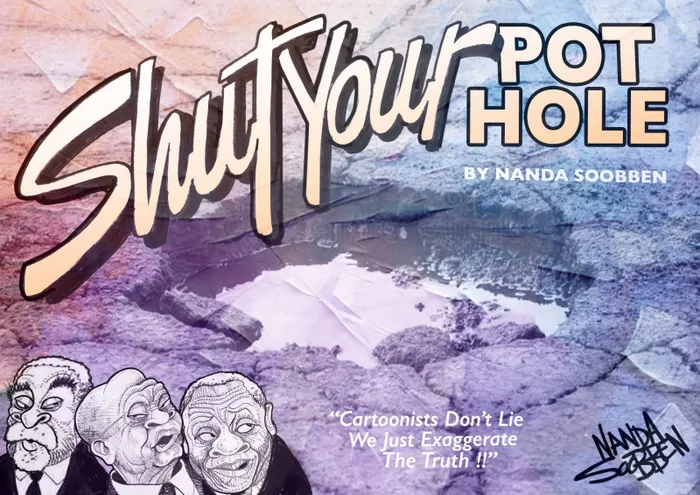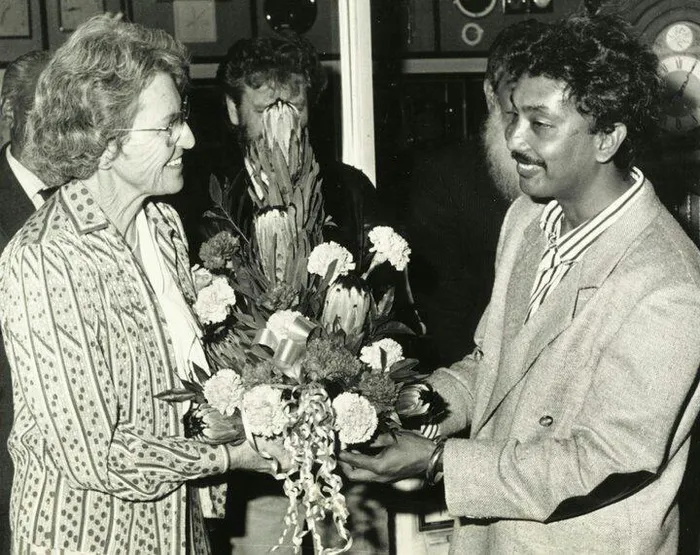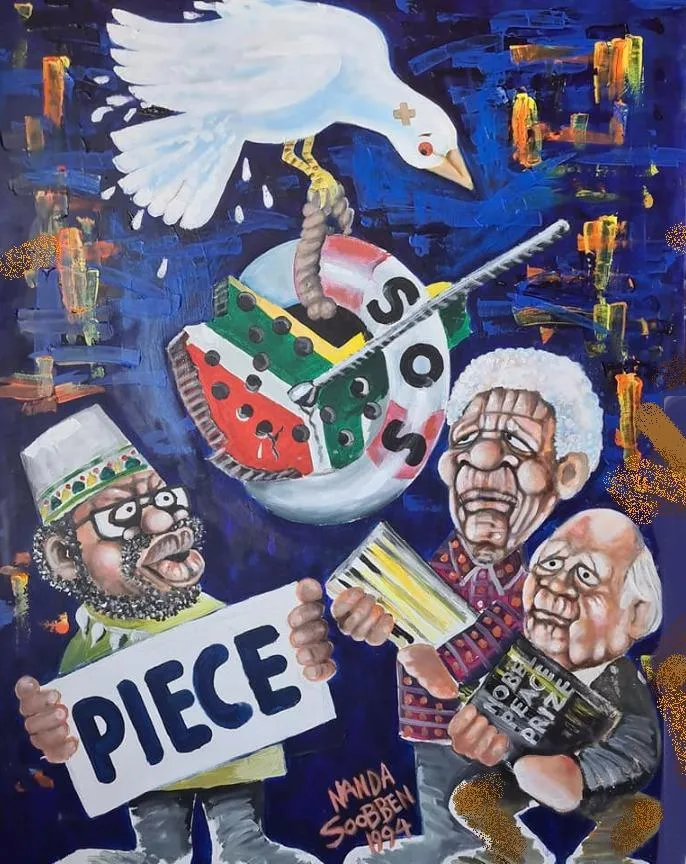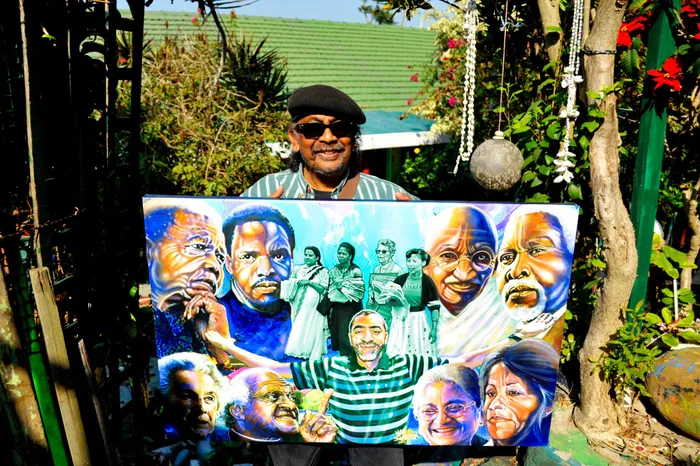Nanda Soobben: the journey of a cartoonist and his new book
Reflecting on his career

The cover of Nanda Soobben's soon-to-be released book.
Image: Supplied
Nanda Soobben, who was referred to as "the POST cartoonist" in his early career, for his assortment of contributions to the title, is preparing to release his third book, Shut Your Pothole.
The book, which will be launched on May 31 at Phansi Museum, contains 140 selected cartoons.
"In my career, which spans almost 40 years, I have done about 3 000 cartoons. This book includes some of the older cartoons and those that were done more recently. They appeared in various newspaper titles, including the Independent Media stable, and syndicated international publications," said Soobben of Isipingo Beach.
The award-winning cartoonist said when he looked through the book and reflected on his career, there were many incidents and people that have shaped his life.

His exhibition on forced removals, Cato Manor: People were living there" was opened by Alan Paton's wife, Ann. Nanda Soobben said Paton was supposed to open the exhibition but he died two weeks earlier.
Image: Supplied
"I was raised in Clairwood and as a child, I always loved drawing. I was nine years old when the teachers at Mobeni Primary School took us to watch Tom Thumb. They thereafter asked us to draw a scene from the story, which I did, and I won first prize for my efforts. I still have the story book. I come from a family who were well-read and politically-conscious. My grandmother, Gangamma Reddy, was in the passive resistance movement and we used to spend our evenings sitting outside our home, in front of the fire, talking about what was happening politically.
"As a teenager, I began drawing on walls with charcoal and chalk. This was done at my house, my friends' buildings, and on the street. My parents used to scold me but this, I guess, was my way of expressing myself on a larger platform. I also drew illustrations for activists, like Strini Moodley, and members of the Natal Indian Congress, who needed placards for demonstrations."
He said one incident stood out for him - that got his career started. And it began with this newspaper title.
"I was in my early 20s and Cape Town Spurs were scheduled to play Verulam Suburbs at Curries Fountain. Back then Rashid Khan was a well-known footballer, so I did a caricature of him. I asked my brother, Charlie, who was a professional soccer player for Verulam Suburbs, to hand the piece to Rashid on match-day but he was too shy.
"I don't know how it happened but Brijlall Ramguthee and Marlan Padayachee, who were sports writers for the paper at the time, saw my work. I was then requested to send some of my cartoons to the editor, which I did. That was how my journey with the POST started and I ended up being referred to as 'the POST cartoonist'.
However, being creative did not pay the bills.
"There was no money in it. I submitted my anti-apartheid cartoons for the sake of the Struggle. I worked as a sign writer by day and completed the cartoons at night. I ended up supplying my work to various newspaper titles, including The Mercury, The Daily News and the Sunday Tribune.
"When I get a request to do a specific cartoon, I instantly know what to do because I am a news junkie. I have my own views on certain matters. News just strikes a chord with me."
From working as a sign writer for Coca-Cola, Soobben opened his own sign-writing business, Magic Brush, in the late 1980s. He, however, sold it a year later.
His career, he said, was, literally, "going international".

Soobben said he painted this "live" at a UDF peace rally at The Playhouse in Durban in 1994 before the the first democratic elections.
Image: Supplied
"Charlie was supposed to visit our aunt, Savithree Reddy, in Brazil. He had soccer trials with the well-known Flamengo club. But he was killed outside a nightclub in Isipingo in 1982. My aunt then encouraged me to visit. She was an influential figure in my career. She asked me why I was wasting my time in South Africa because there were not many opportunities or creative outlets for people of colour. Of course, I had to save enough money and ended up travelling to Brazil around 1988. I went solely because I wanted a better life."
He said Reddy ended up in Brazil after she was prevented from entering Southampton in the United Kingdom in 1961.
"She travelled overseas by ship and customs officials prevented her from disembarking. During the trip, South Africa had become a republic. This marked our formal departure from the British Commonwealth and she was the first victim of not being allowed to enter.
"My aunt then returned to South Africa and began writing newsletters on the Struggle. She later found that Brazil was a liberal, non-racial country and you didn't need a visa to enter. That's how she made Rio her home. She ended up working as a journalist for an English-language newspaper and went on to open a travel agency. My aunt wanted to afford us the same opportunities. That's why she invited us.
"When I went to Rio, it was an awakening. I carried along some of my watercolor paintings, and due to her influence, I ended up having an exhibition there."
But the call to return to South Africa was strong, and Soobben returned home a year later. He married Deseni Moodliar Soobben, a senior journalism lecturer at the Durban University of Technology. They have two children, Sorubi, an attorney, and Dravid, multimedia artist and animator.

Cartoonist Nanda Soobben
Image: File
Soobben also went on to open the Centre for Fine Art Animation and Design, and wrote two books - Wizard of HOD and Witness to a Decade.
"Many people have asked me about publishing a book featuring some of my work. I thought it was about time and I am glad this has finally materialised."
Professor Ashwin Desai wrote the book's foreword."... In a brilliant series of cartoons, he exposes the Lie of the Land, the Pie in Sky, and Shit in the Ocean. Through all this, he makes us laugh and hang between what Lauren Berland calls 'Cruel Optimism' and John Beger labels 'undefeated despair', Nanda's life epitomises this.
"He arrived on the scene in a world dominated by white cartoonists, who were doing gag cartoons without tackling the serious issues. He was mocked for not being funny. But Nanda kept us laughing because of the clever ironies of stupidity he was pointing out through his cartoons which were on another level.
"Nanda is more than a cartoonist, standing above society. He is deeply involved in the burning issues of our time. Taking on people who abuse high office, while sketching those who have made stellar contributions into the walls of history. Nanda is a throwback to the generation of the 70s and 80s, who in the Casbah were called 'men about town'..."
The book will be available in all good bookstores, or call 065 610 6218.